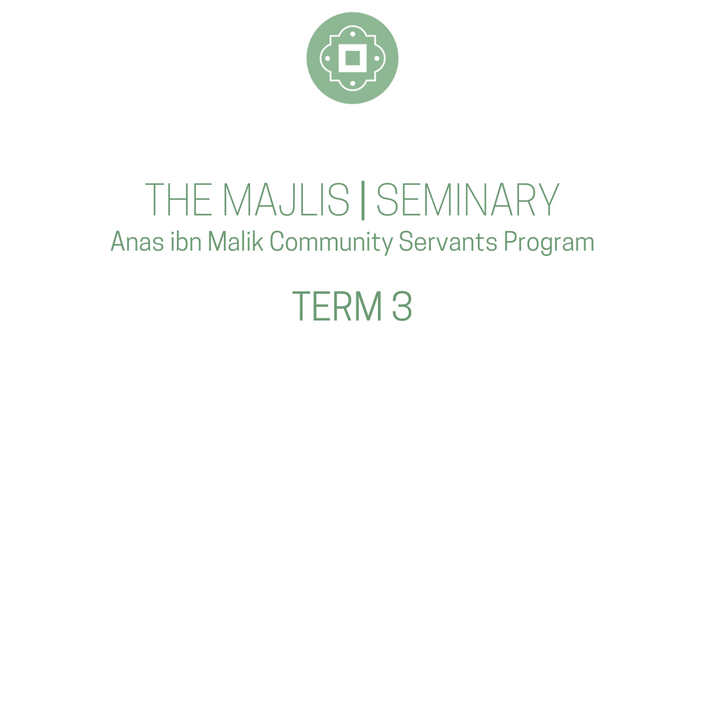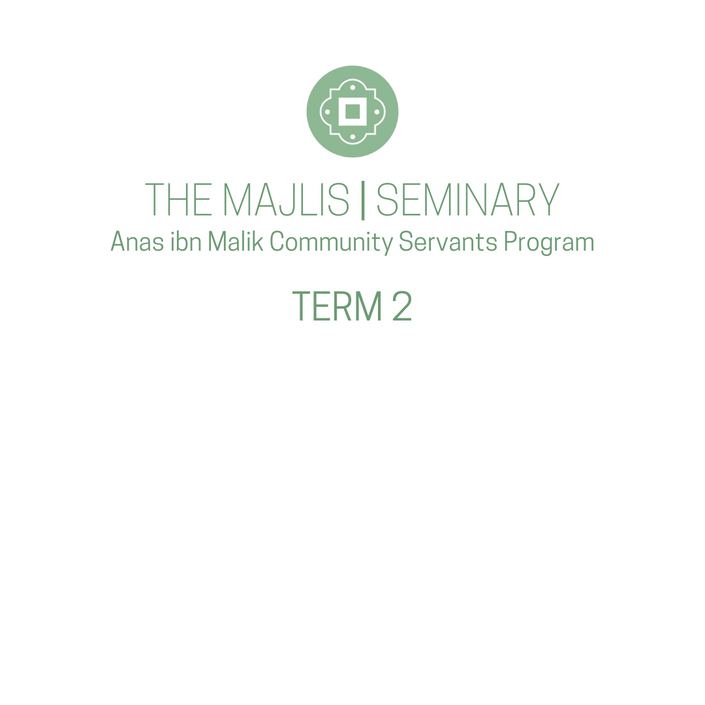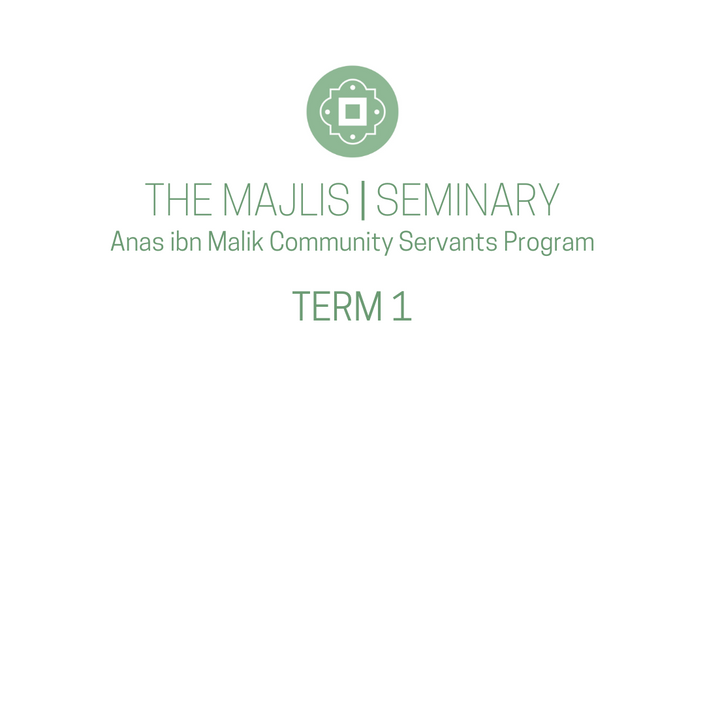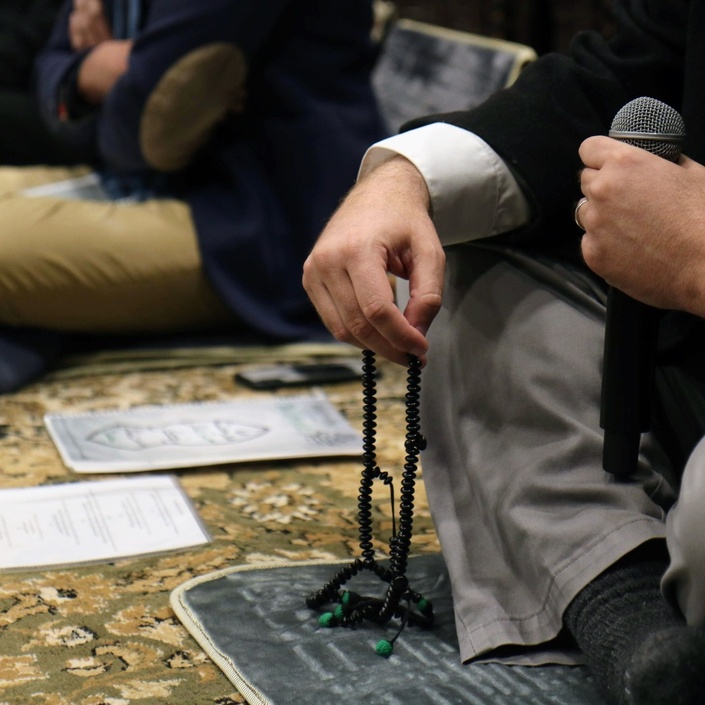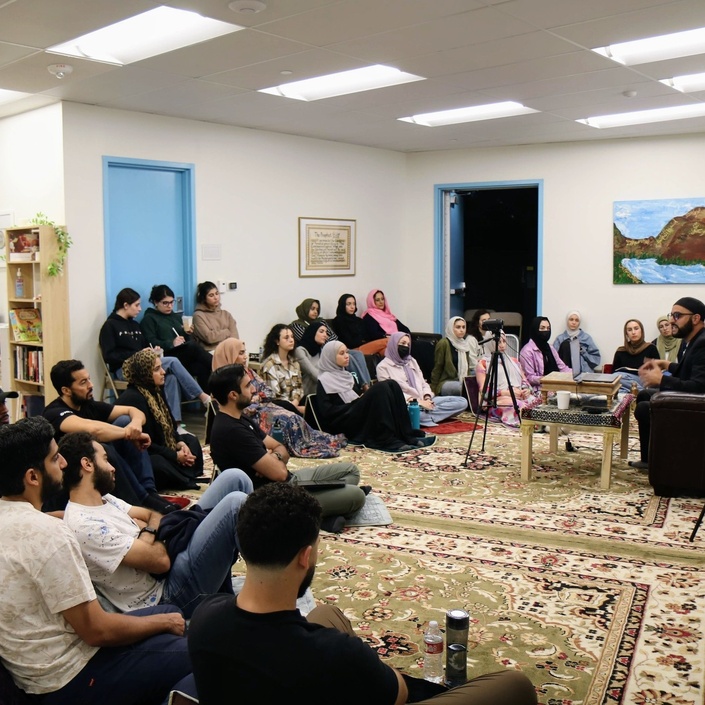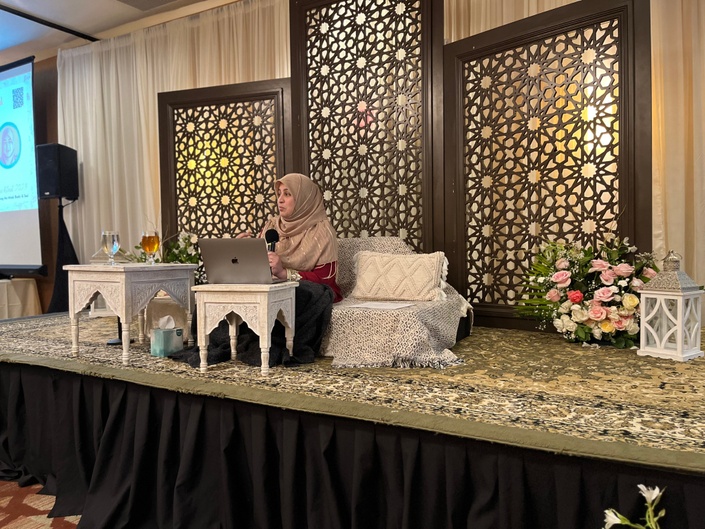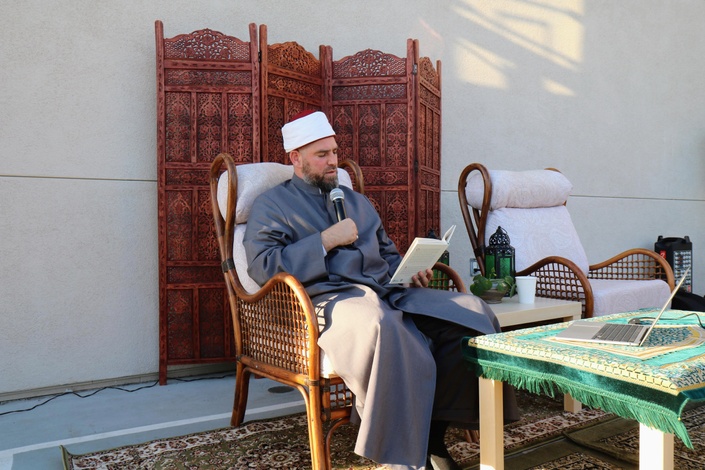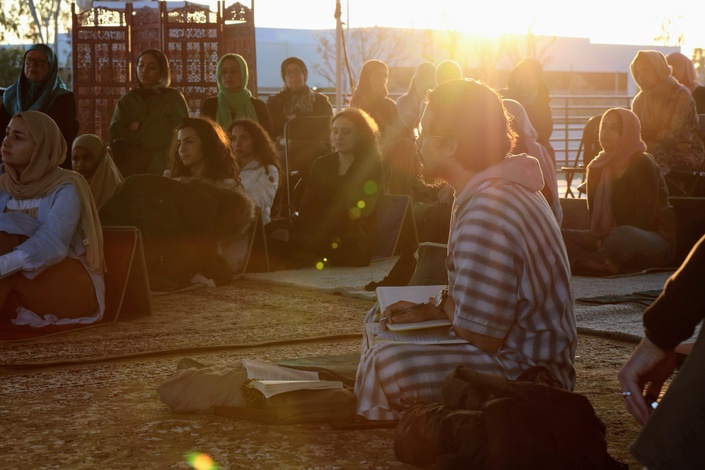The Majlis Seminary
Anas ibn Malik Community Servants Program
The Anas ibn Malik Community Servants Program is the first offering from The Majlis Seminary. It is a two-year program which aims to give a foundational worldview and knowledge base to those interested in Islamic Studies.
It will cover a wide range of topics including theology, law and ethics, spirituality, Quran and hadith sciences, manners and character, and various skills needed for community-based work such as chaplaincy and organizing.
Ideal candidates are community members who want to love and serve their people, like Sayyidna Anas ibn Malik did, and want to connect themselves with the living tradition of Islam in order to do that.
Ultimately, all good in this life and the next comes from taking the path of Prophet ﷺ and connecting ourselves to those who were and are connected to him. When our community work, whether in masajid, schools, or various institutions is not grounded in this reality we find ourselves floundering again and again. We hope and pray that this program will provide the necessary foundations for ourselves, our families, and our communities.

Structure of the Program
A Two-Year Full-Time Equivalent and flexible online program will provide accessibility to high quality courses for each quarter. Each course will have review quizzes after each session and one final exam. Some coursework will be through residential intensives. There will be a total of two in-person residential intensives. Residential Intensives include an educational component, but also time on site helping with The Majlis and spending time with the volunteers and teachers. Experiential more than informational.
We will be releasing the terms as they come, quarter by quarter, starting in Fall 2023. Students can take as long as they need to in the term in order to complete it and move on to the next term. Certificates and Ijazat will be given once the entire 2-year program is completed.
We will offer some classes as one-off but they will not be the priority. The main goal is to have students go through the whole program, even if they need to take a longer amount of time.
The terms will run during Fall (Sept-Nov), Winter (Dec-Feb), Spring (Mar-May), and Summer (June-Aug).
Cost of the Program
$200 per course
$500 per quarter
$2,000 per year
$4,000 for entire program
Books not included.
In-person residential intensives will have an additional cost and be about a week long.
Terms can be purchased as one-time payments or paid for over the course of three months.
There are discounts for on-site community members and regular volunteers.
There are also zakah-based scholarships available. If you think you qualify for any of these please email us at seminary[at]themajlis[dot]us
Anas ibn Malik Community Servants Program
Some Common Questions:
What is the format?
The coursework for the program is entirely online. It is prerecorded and to be done at your own pace. It is not in person and it is not live.
The only thing in person is a yearly residential that will be a week long. This is meant to be more experiential than informational. It is a chance to get to know one another and ourselves better and to see community work in action.
We don’t actually believe this is the ideal way to learn. The best way is at the feet of teachers in person. However, we recognize that our lives are really busy and it’s hard to do that. So we have come up with this format to facilitate studying for those who want to get a basic foundation. If we have further programs with the seminary they probably will not be on this format.
What if I can’t finish the workload in the term?
Once you sign up for the term you will have access to it for as long as you want. If you need to take extra time, take extra time. Then you can just move on to the next term at the following enrollment.
Can I do one course at a time instead of the full load?
You can, but we really prefer if people take the terms as sets, even if they take longer than one quarter to do them. This allows them to take it all in together and to feel like they are part of the group.
Will we have opportunities to interact with the instructors?
We believe that interacting with the instructors is absolutely essential. There are a number of ways this can be done. The first is through the telegram groups. There is a general students group for broader discussions around knowledge and community. There are also dedicated groups for each class where issues related to that class can be discussed in more detail. Our core instructors also teach regularly on-site at The Majlis so you can follow their live classes and/or come visit us in person anytime. Lastly, our instructors also have publicly accessible office hours that can be booked through our website.
I see 3 of the 4 madhhabs as fiqh options, will you add Shafii?
All of the madhhabs are great and we hope we can add that one as well.
What level are the fiqh and usul al-fiqh courses?
This program is meant to provide basic knowledge for community servants. As such the heavier classes such as fiqh, usul al-fiqh, Hadith sciences, and Quran sciences are all at beginner level. Seminary offerings beyond the two-year program would delve into heavier texts.
What is the time commitment for the program?
We adhere to a traditional method of teaching where we study directly from texts and as such it is hard to say how long they will take before they are finished. We are recording one term at a time through the first two years so we will only really know once we get there. However, I think it’s safe to assume that each course will run somewhere from 15-45 hours of video content. Then it will be a matter of how much studying and review the person does.
What if we cannot attend the residential intensive, will we not graduate the program?
It is our hope that most people are able to attend with some advance notice and planning. It is tough on us as teachers to graduate students that we have never met. However, we do understand that there are exceptional cases and we can discuss those as they come. Our goal is not to make things difficult or impossible, but there is a rigor necessary that includes committing to some time in person.
Are there any scholarships or financial aid available?
We will not turn away students based on lack of funds. However, we hope that people will take this knowledge seriously and know that a lot of work goes into the back end of preparing the program and producing the content, as well as regular follow up with the students.
There will be options to pay for the terms as one payment or as three payments spread out over the quarter.
True financial aid will be available and will be zakah based. In order to qualify you will need to email us at [email protected] and fill out a form about your need.
If you are a regular community member of The Majlis in person in Southern California you get an automatic discount of 15% as an appreciation to you because you are the ones that have made this possible. What makes this program special is that we see and interact with you every week.
If you are a regular volunteer in person at The Majlis you get an automatic discount as well, which is much more than the other, because you are the real bread and butter of this organization.
If you are in a different category, but need some help, email us and we can discuss. Again, we want you to be able to learn.
Is Arabic required, is it part of the program?
Arabic is not required. Sometimes the course text will be in Arabic or we may read the original Arabic and translate, but the instruction is in English. When we read the Arabic text it will be more for accuracy and for exposing students to the Arabic so they can slowly grow in their comprehension.
Arabic as a subject is not part of the program. We believe that Arabic is absolutely essential for anyone serious about Islamic Studies. However, we also recognize that it takes a significant time commitment and is not necessary for the foundational levels. So for this level we believe that it is more beneficial to spend time on understanding the religion. At higher levels of study Arabic will be necessary and required.
Some of these courses seem to be the same ones as covered in person at The Majlis in the past, is that correct?
Yes, some of these topics we have covered in the past in in-person sessions. Those old recordings will be removed from YouTube and Soundcloud. Also, we will be making new recordings that are specific to this program. As such they will be more focused on students of knowledge rather than general community sessions. So they will be different in their scope and emphasis.
Are there any pre-requisites for the program?
Only that the student can handle the course load. If they are 16 and up and are serious they should be able to handle it, even if it takes a little extra work and review.
I saw some reference to ijazah, how will that work?
For those that finish the program there will be a certificate of completion that states that they have finished the program. In addition to this the instructors may provide ijazah, for specific courses or in general, to exceptional students. The important thing is that one puts in effort to study and master the material, if they do that then it is easy to acquire ijazat afterwards.
PRIMARY INSTRUCTORS
Shaykh Jamaal Diwan
Shaykha Muslema Purmul
Shaykh Fouad Elgohari
PROGRAM BREAKDOWN
FALL 2023 (SEPTEMBER - NOVEMBER)
- Instruction of the Student & Learner’s Guide to Islam Paper - Sh. Jamaal Diwan
- Islamic Theology: What We Believe and Why - Sh. Fouad Elgohari
- Art of Community - Sha. Muslema Purmul
- Understanding the Sacred Law - Sh. Jamaal Diwan
WINTER 2023/2024 (DECEMBER - FEBRUARY)
- Fiqh of Worship 1 (Hanafi/Maliki) - Sh. Jamaal/Sh. Fouad
- Foundations of Islamic Theology - Sh. Fouad
- Intro to Quranic Sciences - Sh. Jamaal
- Practice of Pastoral Care - Sh. Jamaal
SPRING 2024 (MARCH-MAY)
- Fiqh of Worship 2 (Hanafi/Maliki) - Sh. Jamaal/Sh. Fouad
- Intro Usul al-Fiqh - Sh. Jamaal
- Essentials of Chaplaincy - Ch. Sondos
- 40 Hadith of al-Nawawi Part 1 - Sha. Muslema
LATER CLASSES
- Tafsir of Juz ‘Amma (Part 1)
- Intro Hadith Sciences
- Life of the Prophet
- Tafsir of Juz ‘Amma (Part 2)
- Beginning of Guidance (Part 1)
- Purification of the Heart
- Fiqh of Marriage & Divorce
- Beginning of Guidance (Part 2)
- Art of Hospitality
- Life Cycle Rituals/Fiqh of Chaplaincy
- Organizational Management
- Islamic Manners
- Shamail of the Prophet
- Counseling in Community Work
- Self Care for the Community Servant
- Logic and Critical Thinking
*Slight adjustments in curriculum as we progress are possible at the discretion of the instructors and in consideration of the needs of the students.
Learning Text by Text
Traditionally Islamic studies curriculums were not always degree based and structured in the sense that we have today. Students grew text by text, mastering one at a time, studied properly with a qualified teacher. As they did this in the various disciplines of Islamic Studies they grew until they became teachers themselves. This organic, ground-up method is what we follow at The Majlis.
For this reason it is difficult to give exact lengths of courses before the recordings for them have been completed. You can assume that each class will run in the range of 15-45 hours of content.


